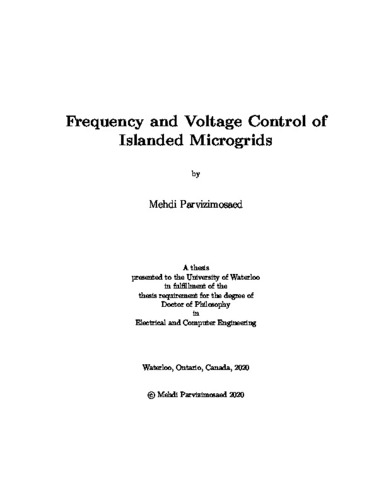| dc.description.abstract | Islanded microgrids (MGs), characterized by distributed generators, power consumers, and energy storage systems (ESSs), are designed to signi cantly enhance self-sustainability of future distribution networks and to provide energy for remote communities. In order to have a stable system, both primary and secondary frequency and voltage control of the MG are critical.
From a primary control perspective, it is essential to maintain frequency and voltage in acceptable ranges. Conventional controllers are designed to regulate system frequency and voltage solely based on droop control theory, and this is mainly provided by fast-response generation units such as ESSs. Therefore, an intelligent power sharing (IPS) control is necessary to maintain frequency and voltage within acceptable ranges, and to share power not only based on generation units' droop values, but also their operating power capabilities. A mathematical model of small-perturbation stability is presented along with performance analysis. Based on analysis and simulation results, the IPS controller offers advantages such as robust performance under load and renewable energy variations, a dynamic compromise between voltage regulation and accurate reactive power sharing among generators, and enhancement of voltage regulation by an adaptive virtual impedance.
From a secondary control perspective, scheduling of generation units based on conventional unit commitment (UC) remains fi xed for the duration between two dispatch intervals; however, demand or renewable generation can continuously change. This stair-pattern scheduling of generation units creates large frequency and voltage excursions at the edge of each dispatch interval. Different from the existing UC mechanisms, a hybrid mid-level the controller is proposed based on communications with a distributed primary controller. It determines optimal power of generation units between two dispatch intervals for the secondary controller while regulating frequency and voltage within desirable ranges. Through several tested scenarios on a CIGRE test system, numerical results show that the mid-level controller can regulate frequency and voltage of the islanded MG. It covers time intervals between those of primary and secondary controllers and avoids the stair-pattern generation scheduling in conventional UCs. Additionally, it reduces both operating cost of MG and degradation of fast-acting generation units' life-cycle.
Subsequently, impact of communication delay on islanded MGs is studied. The delay causes local controllers to use outdated power dispatches at the proposed mid-level controller. The outdated reference power deviates frequency and voltage from their nominal values in primary control. Existing primary and secondary controllers use a communication network assuming no time delay or considering a constant time delay. A mathematical model of constant and time-varying delay in islanded MGs is tegrated into the proposed mid-level controller. This formulation addresses the impact of time delay on transient performance of these controllers. A delay-based controller is designed to mitigate frequency oscillation of islanded MGs in the presence of either small or large perturbations. Numerical results are performed on small and large perturbations to evaluate the impact of time delay on realistic 14-bus CIGRE test system. | en |

